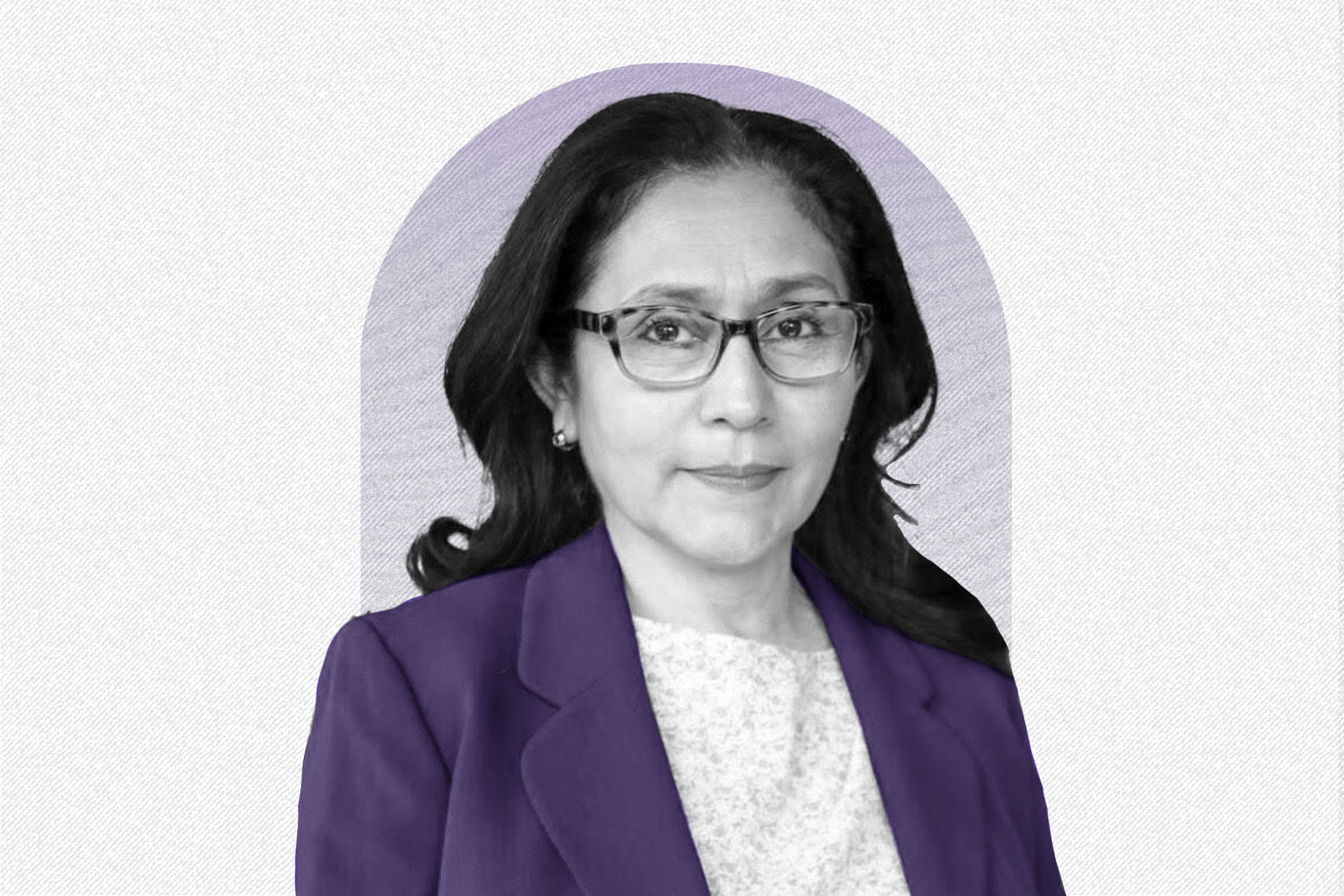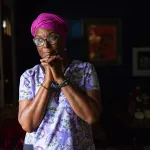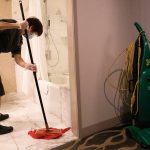This Hispanic Heritage Month, we’re telling the untold stories of women, women of color and LGBTQ+ people. Subscribe to our daily newsletter.
In the United States, at least one-third of domestic workers are immigrants, although this is most likely an undercount. Many are undocumented, and therefore less likely to respond to polling or other data collection efforts. Many are Latina, and their work makes everyone else’s work possible. They clean houses and care for other people’s children. They care for older and disabled adults who need support to live their everyday lives. They do it for little pay and without recourse if they are abused or injured in their workplaces.
For Hispanic Heritage Month, The 19th spoke with Evelyn Saz, one of many women who has done this vital, thankless work. Saz is now an organizer for the National Domestic Workers Alliance and has been instrumental in advocating for the New Jersey Domestic Workers Bill of Rights. The bill would provide health and safety protections to domestic workers that have long been available to workers in factories and offices, including protection from sexual harassment and discrimination.
This interview has been translated from Spanish and edited for length and clarity.
Sara Luterman: Where do you live?
Evelyn Saz: Elizabeth, New Jersey. I have lived here for seven years.
And how old are you?
I’m 54 years old. But I feel 30.
Where are you from?
I was born in El Salvador. I am Salvadoran.
Tell me about your life in El Salvador.
I am the second daughter of four children, three girls and one boy.
We grew up in a fairly impoverished town in El Salvador called Matapan. I was born into an armed conflict, one could say, into the complex situations of economic and social policy in El Salvador.
My father was the director of the public school, a progressive man for his time, with roots deeply founded in justice. My mother was a housewife – a very intelligent woman and a fighter.
-
Read Next:
We moved to the capital due to a threat to my father saying that if he did not leave, they were going to kill him and our family. So we left Matapan with nothing, to San Salvador to start from scratch.
As a young person I became very involved with groups at that time in the church. I was never a catechist, but I was part of youth groups leading other young people.
I went to a church that was visited by Monsignor [Oscar] Romero, before Monsignor Romero started taking a more radical political position. That’s where a lot of young people would meet, talk a lot about the national reality. The life I had lived in my town and what my father had taught led me to want to make change. Most of the young people who were there were beyond fashion, beyond music. We were interested in other types of things.
I went to university. But then the university closed, because it was occupied by soldiers. I had to stop my studies. It was quite painful for me because one of the things that I always wanted was to learn.
After the peace agreements, I also got involved with reintegration into civilian life of both the FMLN ex-insurgents and the Armed Forces.
I hate war. War should not exist. People ask me why I stayed. I always told them that it was my conviction to help those who are suffering. I felt compelled to do things that should not have to be done, much less by young people. We should have been studying, we should have been doing other things. Not dealing with a civil war that was leaving my country bloody.
We passed the reintegration stage. I began to work with community aid organizations. My country, apart from the civil war, was hit by earthquakes and floods. [Eventually] I worked with an organization that defended the rights of women who survived domestic violence.
At that time I was already a mother with two children. I always told the organizations I worked with that we should do direct outreach to women. If there is a penny that falls into [a woman’s] bag, that penny is going to go to her family. The woman is the one who must give everything, the woman is the one who, if she cooks, is the last to eat, or she scrapes the saucepan and that’s what she eats, leaving the rest for her children.
We needed to make women aware that they could also get ahead, to empower them with their rights. We taught them how to get ahead without having to be with an abusive man, for example. We developed entrepreneurship projects for women.
When did you come to the United States and why?
I had the opportunity to come to the United States because at that time in my country, we were suffering a lot of violence from the Mara gang. I had a 15-year-old son and another little one who was 6. If young people did not want to be part of the gangs, they were murdered. I was scared for my children. So I made the decision to leave.
At first I worked for the Consulate of El Salvador. I was there for about a year and a half. I started to get involved in this country, trying to help others and contribute to the Salvadoran diaspora community. I was working a lot with TPS [temporary protected status] people. And then I got involved with local organizations like Cosecha [an organization that advocates on behalf of undocumented immigrants]. I was trying to figure out how people in my community could get their driver’s licenses.
How did you get into doing home care?
I was also trying to see what I could do without [knowing] English. My university degree from El Salvador obviously didn’t work here. And that’s how, during the pandemic, I actually decided to take a home care course. It is not work I did in El Salvador.
After working for a while, I realized that there is a lot of abuse and that it was affecting me. I didn’t know the laws that existed here in New Jersey. I wondered what protections we had and why are we living this way? It bothered me. I would talk to my colleagues and I would ask them how long they had been working as home carers and they would say 20, 10, five [years]. I could see in their faces that their reality didn’t change.
I tried to ask the people from the agencies, “Look are there any protections for home carers?” And I only got [my] obligations: that if a family treats you badly, you have to put up with it. And if you don’t put up with it, you are free to leave. We’ll look for a new client for you. But finding those new clients took so long. As a single mother, I had to pay rent.
The same thing happened with my colleagues. And I said this has to change. But I couldn’t find a way. And that’s why I got involved organizing with other domestic workers, at first, with Cosecha. There were so many domestic workers there. There are many women who took care of children. Most of them didn’t have any documents in this country.
All of that led me to the National Domestic Workers Alliance.
There is one thing I want to clarify. A lot of people say to “ask” for things. But that really bugs me, because we should be saying “demand.” When you ask, you’re asking for something that you want. When you demand, you are doing it in a more forceful way, you’re demanding what you’re entitled to.
Can you tell me a little more about the home care you were doing before you went to work with the National Domestic Workers Alliance? How many clients did you have? What type of clients?
Yeah, when I started with them, [I] only had a few hours a week, which affected my finances incredibly, and the clients I had. I appreciated all of my clients, but for some of them, the situations inside their homes were quite difficult.
I had the experience of a lady who had Alzheimer’s. They don’t prepare you to take care of people with Alzheimer’s. Not at all. They just throw you in. They don’t give you a course. They don’t prepare you.
In my case, I took time to understand what it was. I investigated how to treat her. It was my first time with a person with Alzheimer’s. She was a nice lady. But to be honest, I was suffering a lot. I was suffering because her daughter, from my point of view, was very cruel with her.
I would leave her on weekends and on Monday, I would come to find her beaten up. I reported it to the agency. I talked to her daughter. I asked the agency to talk to her. I took pictures and documented everything. I think that her daughter didn’t like me getting involved in that way. But I felt that it was my duty.
I did what I had to do. I always do whatever I do to the best of my ability and in a professional manner. The work you do can be dignified, no matter what it might be.
On one occasion, my client was very upset. And her daughter started to throw everything around, to move the bed. And she told me, “You’re not doing things right.”
She said very offensive words, not only about me, but about all Latina women and about people from my country. I told her to restrain herself, but she was very harsh with me. And I told her “Look, I’m sorry. I’m sorry for your mother. But I have to leave.”
And she said, “I’m going to call the agency so they can fire you.”
I left. She didn’t want to sign my timesheets, so I couldn’t get paid. I was left with a lot of unpaid work.
The agency knew that lady had a lot of issues. I kept thinking, “Why is she treating me like that?” And I kept talking to other women who were going through the same thing. It all happens inside homes, within the walls, so who is going to notice? I felt totally unprotected. My employer did not protect me. They just said, “We’ll find you another client.”
The search for another client took a long time. And that’s why a lot of home care colleagues put up with abuse. They know if they leave a client, you’re going to go for several weeks without getting paid.
Apart from problems with the clients, there were also problems with the agency. I never asked for time off. Even if I had an illness, I didn’t ask for time off. Because I knew if I asked to leave for any reason, they wouldn’t pay me.
I heard from others who fought with the agency to just get a 50-cent raise. Those of us who were not saying anything, we’re just staying with the same salary. And then I thought, How can this be possible? And it was because everybody had to go and fight on their own. We never fought together.
On some occasions, I worked more than 40 hours in a week. There was no overtime pay.
Once, they gave me two clients: A woman who was blind and a man with Alzheimer’s. They only paid me for one client, but I cared for two. That was the last job I had before I finally got sick with COVID.
How many years did you work as a home care worker before you started working for the National Domestic Workers Alliance?
About three years and a few months, maybe. I stopped when I got COVID in April 2020.
Can you tell me a little bit about the New Jersey Domestic Workers Bill of Rights?
During the pandemic, there was a report done by Rutgers University. They interviewed about 400 domestic workers, asking them how they were doing, how they were feeling and what problems they had.
A lot of them had problems with wage theft. A lot of them were not getting paid. And sick days. Most of the domestic workers – nannies, cleaners and home care workers – are women. Ninety-two percent are women.
So all of that provided the basis to start a campaign here in New Jersey. And especially because of the whole story of discrimination that this sector has. They’re Latin, Black, Asian. They are immigrants. Many of them don’t speak English. And that also creates discrimination.
Since everything happens inside houses, nobody knows.
So from that study, we started to launch a campaign for a Bill of Rights here in New Jersey, and we started a coalition. The coalition is currently working and is made up of more than a hundred local organizations, including unions and religious groups.
The grassroots work is really the backbone of all of this. Women need to know that we have no protections right now, but we can have them through a bill of rights.
At the legislative level, it is important to educate officials. We need to tell them that the person who comes to take care of you, your mom, your children, is a human being. When you get to your house, you see it clean, and you see your children doing well, and your elderly family doing well. But you don’t understand that a person did it. You don’t think about if that person is well paid or if they have rights.
One of the things that really stuck with me was that legislators and officials didn’t know that we didn’t have rights. They assumed we had them already.
For us, it is fundamental that this Bill of Rights passes, for everything we have talked about. For justice. Because what we do really matters. If a home care worker doesn’t show up, the family’s world falls apart. How is the family supposed to go to work? How is the family going to support their children or the person they’re caring for? But we have families too.
Who are your heroes? Who inspires you?
I am inspired by the workers. But I am also inspired by Monsignor Romero. He has inspired me throughout my life and is my hero from youth. I’m inspired by my colleagues in the National Domestic Workers Alliance. I’m inspired by my family – my mom, my children. Especially my youngest son.
Is there anything I didn’t ask about that you think is important for people to know about domestic workers, especially Latina domestic workers?
We are here in this country and we are women who fight. We are women who want to get ahead, women with strong roots of struggle and conviction. We are going to continue forward in this fight until we win.








